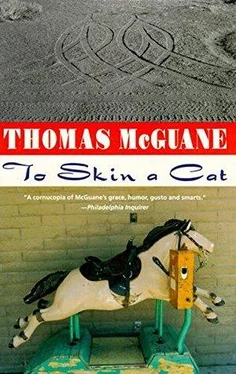Chino stares at the screen, trying to get his bearings.
In the kitchen in Presidio Heights, Jane, pressing out little silhouette men on a buttered cookie sheet, has to dust her hands to answer the door. It is Donna, and she tells Jane how to find Marianne.
La Costa makes up Marianne’s eyes and powders her golden cheeks with a sable brush. Neither of them says a word.
Bobby comes in from the Palace of the Legion of Honor, where he saw a documentary about the end of the elephants. “They had these fabulous aerial photographs of elephants in their death throes. Then there was this terrific shot of an enormous bull who had died long ago, and all he was was like this terrible emblem on the desert floor.”
Jane replies, “You can find Marianne any night after nine in the Room of the Dons at the Mark Hopkins. She’s a whore.” Then Jane says to Bobby, “Stay with me.”
Bobby says, “Stay with you? Without your cross-referenced street guide, I wouldn’t have been with you in the first place.”
The Room of the Dons is a dark, paneled room. Marianne sits at the bar against the backdrop of paintings that depict the mythical Amazons of an imaginary California. Bobby sits next to her and rests his head on her shoulder. He holds her arm in both of his hands.
“Oh, my baby.”
“Hello, Bobby.”
“Has it been awful?”
“No.”
“Can we go?”
“We need a room.”
“Can we go home?” says Bobby.
“I’ve got a place.”
Once they’re inside Marianne’s room in the condominum, Bobby turns his eyes toward her in terrified suspension. He walks to the window and its pricey vista.
“Am I going to have to pay?” he asks.
“Yes.”
“Then I think you’re trapped.”
“No, you are,” she says.
Bobby hands her his wallet. “I don’t want to hear the numbers. Take out how much it is.”
Marianne peels the bills into her purse and gives Bobby his wallet back.
“Shall I undress you?” she asks.
“Did you take out for that?”
“I took out for everything,” she says slowly. And for once in Bobby’s life pure desire pours through him like flame. For once.
Having quietly let himself in, Chino waits his turn in the front room. But, as with Bobby, nothing happens quite as he has foreseen it. Because Marianne’s door bursts open and Bobby flings himself into the hallway, a knife plunged in the base of his neck, jetting fatal quantities of blood on everything. Bobby clambers down the hallway toward Chino like a bride in a dream, smearing the walls as he goes, reaching, reaching toward the only man in the place.
The bloody bed is repeatedly ignited by flashbulbs. The officer turns to the press for a moment of candor. The people have to know. A stretcher passes covered with a sheet, the anonymous contents of which constitute a valediction to every long walk off every short pier in America.
The officer says, “We have no clues. Okay? You can see he was well off. He has no record of employment. Y’with me so far? Perhaps he was living on a trust fund. Since we don’t know what was here, we don’t know what was stolen. I think there’s a very real chance that, as a man of independent means, he kept too many valuables around. Okay? Such men are very relaxed about their possessions. You could pick the lock; you could buy the doorman. There’s more than one way to skin a cat. But this much is certain: I cannot offer any encouragement that your readers will ever hear the end of this story.”
Thomas McGuane is the author of several highly acclaimed novels, including The Sporting Club; The Bushwhacked Piano , which won the Richard and Hinda Rosenthal Award of the American Academy and Institute of Arts and Letters; Ninety-two in the Shade , which was nominated for the National Book Award; Panama; Nobody’s Angel; Something to Be Desired; Keep the Change ; and Nothing but Blue Skies. He has also written To Skin a Cat , a collection of short stories, and An Outside Chance , a collection of essays on sport. His books have been published in ten languages. He was born in Michigan and educated at Michigan State University, earned a Master of Fine Arts degree at the Yale School of Drama and was a Wallace Stegner Fellow at Stanford. An ardent conservationist, he is a director of American Rivers and of the Craighead Wildlife-Wildlands Institute. He lives with his family in McLeod, Montana.












